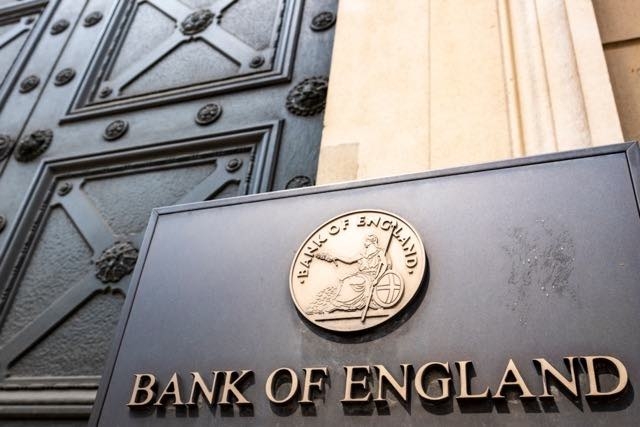The Bank of England has kept its base rate at 5.25% for the third month, in line with expectations.
The majority of forecasters expected rates to be held at 5.25%.
At present, experts expect rates to remain at this level "higher for longer", with some predicting the base rate may not see a meaningful reduction until mid-2024 or even 2025 or 2026.
The Bank's Monetary Policy Committee (MPC), which sets the rate, voted 6 to 3 to hold the rate. Three members wanted to increase the rate by 0.25 percentage points to 5.5%.
The Bank's base rate is currently at its highest level for 15 years.
The Bank's Monetary Policy Committee says its aim remains to continue to nudge CPI inflation towards its long-term target of 2%.
CPI inflation in the 12 months to October, announced in November, fell to 4.6%, a significant drop on the 6.7% rate in September. CPI has now more than halved from the 10.1% rate seen in March. However inflation remains stubbornly high by long term standards and the MPC says progress in 2024 may be slow, with some blips along the way.
The MPC said in a statement that CPI inflation may not return to its 2% target until 2025.
The MPC added: "The MPC’s remit is clear that the inflation target applies at all times, reflecting the primacy of price stability in the UK monetary policy framework. The framework recognises that there will be occasions when inflation will depart from the target as a result of shocks and disturbances. Monetary policy will ensure that CPI inflation returns to the 2% target sustainably in the medium term.
"Since the MPC’s previous decision, CPI inflation has fallen back broadly as expected, while there has been some downside news in private sector regular AWE (Average Wage Earnings) growth. However, key indicators of UK inflation persistence remain elevated. As anticipated, tighter monetary policy is leading to a looser labour market and is weighing on activity in the real economy more generally. Given the significant increase in Bank Rate since the start of this tightening cycle, the current monetary policy stance is restrictive."
The MPC says it will continue to monitor closely indications of "persistent inflationary pressures and resilience in the economy as a whole."
There are some signs in the mortgage market that longer term fixed rates are beginning to fall slightly and savers are benefiting from rates much higher than they have been used to in recent times.
Industry experts said the Bank's decision to hold the rate was a sensible one but a decline in economic growth in 2024 and the international picture may spur a rethink in policy.
Adam Ruddle, chief investment officer at LV=, said: "As widely expected, the Bank of England is maintaining the bank rate at 5.25%. Following signals from the US that their rate hiking cycle is over, the Bank is expected to follow suit.
"We are now focused on an expected pivot from the Bank to rate cutting in 2024. Whilst agreeing that rates are likely to be cut next year, I believe the markets may be slightly disappointed having already priced in five quarter point rate cuts in 2024. Rate cuts will be a relief to the UK public who will likely feel the effects on their finances next year. LV= research indicates that there are green shoots of recovery as fewer people reported increases to their outgoings."
Simeon Willis, chief investment officer at XPS Pensions Group, said: “Whilst the Bank has again held interest rates at 5.25%, pension schemes will be interested in market reaction to this and, in particular, whether any rate cuts could be more imminent than previously expected. Whilst gilt yields have closely tracked the increase in the Bank rate over the past year, the potential for gilt yields to fall from here is substantial.
"The PPF’s “Purple Book” published last week estimated that aggregated UK defined benefit buyout surpluses stood at c.£150bn as of 31 March 2023. Schemes will be particularly keen to ensure that any knock-on impacts to long-term interest rates do not materially worsen the positive funding levels they’ve built up over the last couple of years.
"Going into the new year, schemes may view now as a good time to review the appropriateness of their investment strategies and to ensure they are suitably protected against any potential adverse market movements. This will be particularly important for schemes where buyout is a realistic short-to-medium-term objective.”
Jonny Black, chief commercial & strategy officer at Abrdn Adviser, said: “The Bank of England has been clear that it doesn’t plan to drop interest rates until the risk of inflation resurging has passed. Today’s ‘hold’ decision shows that it feels now is still too soon to do this.
“It’s not clear when rate reductions will come – new forecasts released earlier this week suggest it could not be until 2026. Clients will value reassurance that their savings and investment strategies are adapted to deliver good outcomes for them given current conditions, and that their advisers are on hand to help them make changes to their strategies should circumstances change quickly in the future.”
The next base rate decision will be on 1 February.

